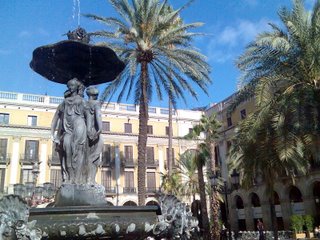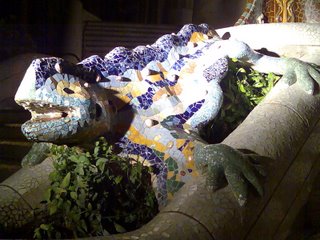One More Week To The Term Break

Reflections on a year in London...part diary, part travelogue, part commentary, and spiced perhaps with a gripe or two.





It was only in his later years that Miró formed an increasingly personalized style, moving more and more into surrealism and abstraction, as typified by the three examples at the top of this post. To me, this developmental process was similar to what his near contemporary from the Netherlands Piet Mondrian went through. But whereas Mondrian located art in the form of straight black lines at right angles, Miró's style was much more expressive and free flowing, although both displayed a penchant for using bright primary colours.
In Miró's art, you typically see a bland single-tone background, with no depth and no sense of perspective. There are certain recurrent elements, such as representations of birds, insects, faces and even individual letters, all rendered with a whimsical, almost childlike playfulness. But they all stemmed from the hands of a true master - someone able to translate visually a dreamlike world we can only imagine. And with rare exceptions, the sense you get from is works is that of charm, innocence and fun.
In his later years, Miró experimented with other media, such as sculpture and textile-making, examples of which were also displayed at the museum. I certainly enjoyed myself thoroughly, so let me end with two more examples of his works - or what I'd call "Paintings I'd like to hang in my bathroom if I were rich enough":




The actual wedding ceremony was held the following morning at the Basilica de Santa Maria del Mar, an amazing Catalan Gothic structure located in the middle of Barcelona's Old Town. The interior was rather sparse and austere, except for panels of resplendent stained glass works, but that added to the rather hallowed atmosphere.


 Thus ended my first experience of a European wedding - posh, elegant and genteel. I was certainly glad to have made the trip to Barcelona, not just to celebrate with DB and his new Missus - we've promised to meet up for a beer back in London later this year - but also to take some time out exploring the city. So watch this space. I've only quickly described the wedding related proceedings. I'll write again with more on my impressions of Barcelona.
Thus ended my first experience of a European wedding - posh, elegant and genteel. I was certainly glad to have made the trip to Barcelona, not just to celebrate with DB and his new Missus - we've promised to meet up for a beer back in London later this year - but also to take some time out exploring the city. So watch this space. I've only quickly described the wedding related proceedings. I'll write again with more on my impressions of Barcelona.
I took no issue with many of her arguments, but I felt she wasn't very convincing over some key points. For instance, in applying the first formula on Al-Qaeda, Dr Cronin criticised the apparent obsessive focus on capturing and killing Osama bin Laden. His death, she stressed, would not end Al-Qaeda terrorism.
So far so good. Everyone nodded in agreement. No one can dispute that. But it was interesting how she chose to use the passive voice in presenting this view. Because what I felt she did was merely to conjure up a false phantom. I can't recall any serious political leader, certainly not President Bush, who is on record arguing that by the death of Osama bin Laden would rid the world of Al-Qaeda terrorism. Of course there are good reasons to focus on killing him - both symbolic and substantive reasons. And of course it makes for good media airtime and copy to personalise the struggle. I may stand corrected on this point. But it's a pretty safe bet that no notable political figure has actually asserted publicly that the decapitation strategy would serve to end terrorism as we know it. And therefore it was rather unproductive of Dr Cronin to have criticized that viewpoint.
She also acknowledged that the Al-Qaeda had many regional affiliates, and that the network could be weakened if governments focused attention on dealing with those groups at the local level, many of which held separate nationalist-political objectives. But the only example she could cite was the case in Morocco. Applying her tenet to Southeast Asia, I wonder how Jemaah Islamiyah could ever be classified as a nationalist group, with negotiable aspirations. For their vision of a Daulah Islamiyah Nusantara stretching across much of the regions is maximalist in nature, just as Al-Qaeda's notion of a reconstituted global caliphate is. There is, undoubtedly, no easy solution. Except that I don't think what Dr Cronin proposed was tenable at all.
I got the sense as well that Dr Cronin was seeking to draw too many parallels between the Al-Qaeda terrorist threat of today with the disparate and diverse forms of terrorism yesterday. To be sure, policy makers need to open themselves up to competing perspectives, before deciding on the course to take. Indeed, we should learn from history. But by focusing so much on what has happened in the past, we run the risk of being blinded to the unique danger that Al-Qaeda presents - an unprecedented global threat that is deeply ideological in nature, sophisticated in method, catastrophic in outcome, and sustained in duration. Techniques of old may not necessarily work right now.
I'm just getting this off my chest now because I don't think I was in a good position to speak up yesterday. The event wasn't really interactive in nature. I think both the chair and the audience preferred that only questions were posed, without any pontificating, although quite a few did manage to sneak in comments disguised as questions. But generally, it's a good rule or norm - one that I would endorse, except that it constrained me from challenging the speaker's assertions openly. Heh.
The talk next week also focuses on terrorism. A professor from Georgetown University is coming to speak on "The Preventive Paradigm in US Counterterrorism Policy: Why It Has Made Us Less Safe and Less Free" Let's see how that goes. From what I've observed so far of the questions yesterday, it's a mostly left-wing and liberal crowd here at UCL, one which is critical of the current administration in Washington. Therefore, I don't expect his talk to go down negatively.





Major-General Andrew Ritchie is the newly appointed Director of the Goodenough College. Last evening, as part of a series of activities for Welcome Week, he delivered the inaugural Port Talk, speaking on "Perspectives on Leadership". It drew a capacity crowd, with most - myself included - having just come from enjoying the first Dining In night at the College. No one turns down a free meal.
I had broadly understood the concept of after dinner seminars, but had also been wondering what Port Talks could mean. Yet it was a no-brainer, really. Plenty of port was served. The only thing missing was some good cheese.
The General was able to draw upon his vast and long experience in the British Army. With a very approachable manner, he shared many anecdotes and stories, but he sought also to present what he considered were the five key principles of leadership:
I enjoyed the talk thoroughly. To illustrate these principles, Gen. Ritchie brought up many examples from his military background. The five qualities he cited are certainly worth emulating, on both an abstract and a practical level.
But I think what's difficult is how one then interprets and translates these principles into reality, applying them across different contexts. Take loyalty, for instance. What does that mean? Loyalty to whom?
I am reminded of this scene from Yes, Minister, one of my all-time favourite classic British comedies. In the episode A Question of Loyalty, the Minister Jim Hacker is caught - as he always is - between the civil service department which he leads, and the political Cabinet, to which he also belongs. In short, evidence of civil service waste has surfaced. A parliamentary select committee's breathing down his neck. Should Hacker defend his department? Or should he take a more contrarian approach? You can get a brief synopsis of the episode here.
Midway through the episode, Hacker is summoned to Downing Street, where he meets Sir Mark Spencer, special advisor to the Prime Minister. They discussed the concerns raised by the Select Committee. What course of action should I take, Hacker wonders. Spencer replied that the answer was obvious. "There's only one course open to you. Absolute loyalty."
Hacker agrees immediately. On the surface, it seems an easy principle to agree with, a platitude, almost. But then he freezes. "Who to?"
"That's your decision," Spencer responds tersely.
And therein lies the problem. Loyalty to whom? We all have multiple roles and identities. When we're faced with a problem in the office, perhaps even an ethical issue, it's easy to proclaim the need for loyalty. But does that mean loyalty to oneself? Loyalty to one's family? Loyalty to one's department? Loyalty to one's superior? Loyalty to the political leadership? Loyalty to the public interest? It's never an easy decision. Perhaps, a true leader is one who'd be able to make the correct judgement.
